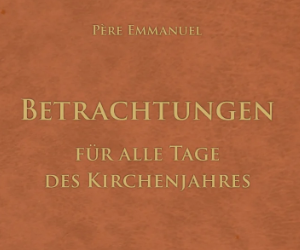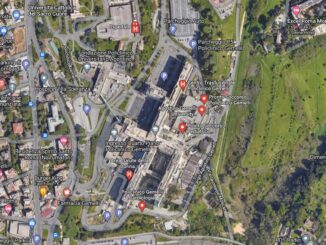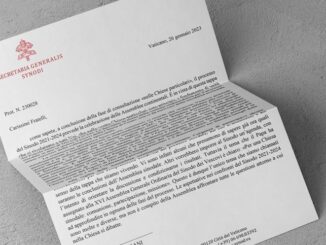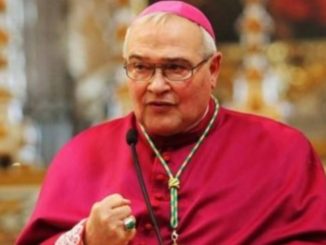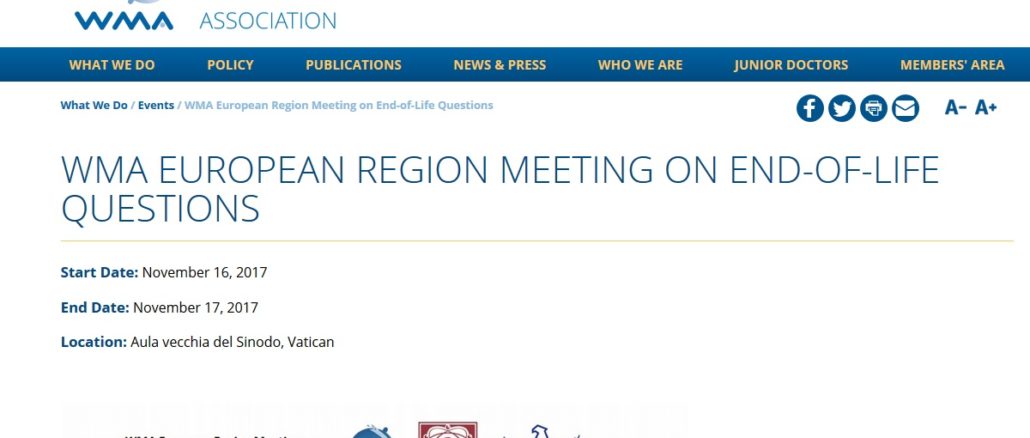
Am vergangenen 16./17. November fand auf Einladung der Päpstlichen Akademie für das Leben im Vatikan ein Kongreß der World Medical Association (WMA) zu Fragen des Lebensendes statt. Katholisches.info berichtete im Vorfeld und danach: Päpstliche Akademie für das Leben lädt Euthanasie-Befürworter ein, Papst Franziskus und seine „Heiligen Worte“ über die Euthanasie und Papst für aktive Sterbehilfe?
Dazu ging uns folgende Stellungnahme vom Vorstandsvorsitzenden der Deutschen PalliativStiftung, dem Palliativmediziner Thomas Sitte, zu. Dr. Sitte war selbst Teilnehmer des Kongresses.
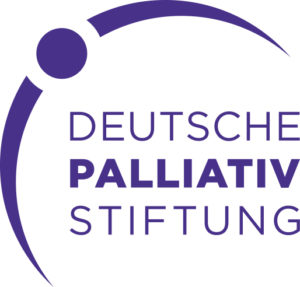
Sehr geehrter Herr Schneider,
Zu glauben Papst Franziskus sei ähnlich wie ein belgischer Orden für Euthanasie ist absurd.
Gerne stelle ich Ihnen für Ihr Nachrichtenportal kurz die Fakten zum WMA-Kongress über “end of life questions” zusammen. Es war anders als bei Ihnen berichtet, keine Veranstaltung der Katholischen Kirche, sondern des Weltärztebundes mit Unterstützung der Kirche. Übrigens kann Ihr Leser auf der Seite des Vatikans selber die Botschaft des Papstes zum Kongress nachlesen. Es wird also nicht vom Vatikan totgeschwiegen …
Es sollte beim Kongress das breite Bild der ethischen Einstellungen in Europa nachgezeichnet und diskutiert werden. Es war niemals geplant, z. B. bereits ein Thesenpapier für die Öffentlichkeit daraus zu entwickeln. U. a. deshalb nicht, da dieser Kongress einer von mehreren auf der Welt war, auch in Nord- und Südamerika, in Afrika und Asien werden parallele Veranstaltungen des WMA stattfinden. Aus meiner Sicht war der europäische Kongress gerade durch den Ort in der Aula vecchio des Vatikans und die so klare Botschaft des Papstes eine etwas andere und sehr gelungene Veranstaltung. Sehr kontrovers, dennoch weitgehend sachlich. Es gab auch völlig anders, als bei Ihnen berichtet ein sehr klares Votum am Ende gegen jede Lebensverkürzung durch Ärzte.
Es mag sein, dass einige Ihrer Autoren oder Leser die Auffassung vertreten, dass bereits jede Form des Sterben Zulassens Euthanasie sei. Diese Auffassung darf man in einer pluralen Gesellschaft haben, ebenso, wie eine glücklicherweise kleine Minderheit von Ärzten die Auffassung vertreten darf, die Gesellschaft brauche organisierten (ärztlich) assistierten Suizid und Tötung auf Verlangen. Wer jedoch in der Rettungsmedizin, auf der Intensivstation oder eben gerade auch in der Palliativversorgung einige tausend Menschen bis zum Tod begleitet hat, der weiß, dass immer diese Fragen am Lebensende gestellt werden müssen. Und, sie müssen Antworten bekommen, die umgesetzt werden.
Ohne diese Antworten kann der Mensch in der heutigen medizinischen Versorgung nicht mehr sterben. Denn, ob ich eine künstliche Ernährung und/oder Flüssigkeitsgabe fortführe, noch Antibiotika gebe, die Nierenfunktion, die Atmung, den Herzschlag unterstütze oder auch ersetze, sind aus ethischer Sicht ausschließlich quantitative Fragen. Qualitativ kann ich mit den heutigen medizinischen Möglichkeiten fast jede Körperfunktion unterstützen oder gar ersetzen. Das gilt (leider) prinzipiell auch in Todesnähe und beim Sterbenden.
Deshalb tat Klärung Not. Und deshalb bin ich auch sehr froh, Teil des PAL-LIFE Projektes der Päpstlichen Akademie für das Leben zu sein, die am 28. Februar 2018 mit einem ersten Kongress starten wird um die passenden Antworten zu suchen und zu finden. Eine gute Palliativversorgung überall und für jeden verfügbar ist eine mögliche Antwort auf den zunehmenden Trend zur Beihilfe zur Selbsttötung und Tötung auf Verlangen. Zum PAL-LIFE Projekt finden Sie die Informationen hier:
Damit Sie und Ihre Leser nun besser beurteilen können, was beim Kongress der WMA geschah, möchte ich Ihnen die primären Quellen zur Verfügung stellen.
Kardinal Turkson verlas die Botschaft S.H. Papst Franziskus, die ich Ihnen hier vollständig einfüge. Solch komplexe Zusammenhänge sollte man nicht mit herausgerissenen Zitaten bewerten. [Hervorhebungen in der Botschaft von Dr. Sitte.]
Pope Francis: not shortening life, not futilely resistence to death
On November 16th Cardinal Turkson has read the Pope‘ Message to the Meeting on End-of-Life Questions in the Old Synod Hall, jointly organized by the Pontifical Academy for Life, the World Medical Association, the German Medical Association.
To My Venerable Brother Archbishop Vincenzo Paglia President of the Pontifical Academy for Life
I extend my cordial greetings to you and to all the participants in the European Regional Meeting of the World Medical Association on end-of-life issues, held in the Vatican in conjunction with the Pontifical Academy for Life.
Your meeting will address questions dealing with the end of earthly life. They are questions that have always challenged humanity, but that today take on new forms by reason of increased knowledge and the development of new technical tools. The growing therapeutic capabilities of medical science have made it possible to eliminate many dis-eases, to improve health and to prolong people’s life span. While these developments have proved quite positive, it has also become possible nowadays to extend life by means that were inconceivable in the past. Surgery and other medical interventions have become ever more effective, but they are not always beneficial: they can sustain, or even replace, failing vital functions, but that is not the same as promoting health. Greater wisdom is called for today, because of the temptation to insist on treatments that have powerful effects on the body, yet at times do not serve the integral good of the person.
Some sixty years ago, Pope Pius XII, in a memorable address to anaesthesiologists and intensive care specialists, stated that there is no obligation to have recourse in all cir-cumstances to every possible remedy and that, in some specific cases, it is permissible to refrain from their use (cf. AAS XLIX [1957], 1027–1033). Consequently, it is morally licit to decide not to adopt therapeutic measures, or to discontinue them, when their use does not meet that ethical and humanistic standard that would later be called “due proportion in the use of remedies” (cf. CONGREGATION FOR THE DOCTRINE OF THE FAITH, Declaration on Euthanasia, 5 May 1980, IV: AAS LXXII [1980], 542–552). The specific element of this criterion is that it considers “the result that can be expected, taking into account the state of the sick person and his or her physical and moral resources” (ibid.). It thus makes possible a decision that is morally qualified as withdrawal of “overzealous treatment”.
Such a decision responsibly acknowledges the limitations of our mortality, once it becomes clear that opposition to it is futile. „Here one does not will to cause death; one’s inability to impede it is merely accepted“ (Catechism of the Catholic Church, No. 2278). This difference of perspective restores humanity to the accompaniment of the dying, while not attempting to justify the suppression of the living. It is clear that not adopting, or else suspending, disproportionate measures, means avoiding overzealous treatment; from an ethical standpoint, it is completely different from euthanasia, which is always wrong, in that the intent of euthanasia is to end life and cause death.
Needless to say, in the face of critical situations and in clinical practice, the factors that come into play are often difficult to evaluate. To determine whether a clinically ap-propriate medical intervention is actually proportionate, the mechanical application of a general rule is not sufficient. There needs to be a careful discernment of the moral object, the attending circumstances, and the intentions of those involved. In caring for and ac-companying a given patient, the personal and relational elements in his or her life and death – which is after all the last moment in life – must be given a consideration befitting human dignity. In this process, the patient has the primary role. The Catechism of the Catholic Church makes this clear: “The decisions should be made by the patient if he is competent and able” (loc. cit.). The patient, first and foremost, has the right, obviously in dialogue with medical professionals, to evaluate a proposed treatment and to judge its ac-tual proportionality in his or her concrete case, and necessarily refusing it if such propor-tionality is judged lacking. That evaluation is not easy to make in today’s medical context, where the doctor-patient relationship has become increasingly fragmented and medical care involves any number of technological and organizational aspects.
It should also be noted that these processes of evaluation are conditioned by the growing gap in healthcare possibilities resulting from the combination of technical and sci-entific capability and economic interests. Increasingly sophisticated and costly treatments are available to ever more limited and privileged segments of the population, and this raises questions about the sustainability of healthcare delivery and about what might be called a systemic tendency toward growing inequality in health care. This tendency is clearly visible at a global level, particularly when different continents are compared. But it is also present within the more wealthy countries, where access to healthcare risks being more dependent on individuals’ economic resources than on their actual need for treat-ment.
In the complexity resulting from the influence of these various factors on clinical practice, but also on medical culture in general, the supreme commandment of responsible closeness, must be kept uppermost in mind, as we see clearly from the Gospel story of the Good Samaritan (cf. Lk 10:25–37). It could be said that the categorical imperative is to never abandon the sick. The anguish associated with conditions that bring us to the threshold of human mortality, and the difficulty of the decision we have to make, may tempt us to step back from the patient. Yet this is where, more than anything else, we are called to show love and closeness, recognizing the limit that we all share and showing our solidarity. Let each of us give love in his or her own way—as a father, a mother, a son, a daughter, a brother or sister, a doctor or a nurse. But give it! And even if we know that we cannot always guarantee healing or a cure, we can and must always care for the living, without ourselves shortening their life, but also without futilely resisting their death. This approach is reflected in palliative care, which is proving most important in our culture, as it opposes what makes death most terrifying and unwelcome—pain and loneliness.
Within democratic societies, these sensitive issues must be addressed calmly, seriously and thoughtfully, in a way open to finding, to the extent possible, agreed solutions, also on the legal level. On the one hand, there is a need to take into account differing world views, ethical convictions and religious affiliations, in a climate of openness and dialogue. On the other hand, the state cannot renounce its duty to protect all those involved, defending the fundamental equality whereby everyone is recognized under law as a human being living with others in society. Particular attention must be paid to the most vulnerable, who need help in defending their own interests. If this core of values essential to coexistence is weakened, the possibility of agreeing on that recognition of the other which is the condition for all dialogue and the very life of society will also be lost. Legislation on health care also needs this broad vision and a comprehensive view of what most effec-tively promotes the common good in each concrete situation.
In the hope that these reflections may prove helpful, I offer you my cordial good wishes for a serene and constructive meeting. I also trust that you will find the most ap-propriate ways of addressing these delicate issues with a view to the good of all those whom you meet and those with whom you work in your demanding profession.
May the Lord bless you and the Virgin Mary protect you.From the Vatican, 7 November 2017
Francis
Der Link zur WMA-Veranstaltung mit den Präsentationen zum Download.
Die Ärztezeitung brachte eine seriöse, kurze Zusammenfassung des zweitägigen Kongresses:
Mit freundlichen Grüßen
Dr. med. Thomas Sitte
Vorstandsvorsitzender
Deutsche PalliativStiftung
Bild: WMA/Deutsche PalliativStiftung (Screeenshots)
